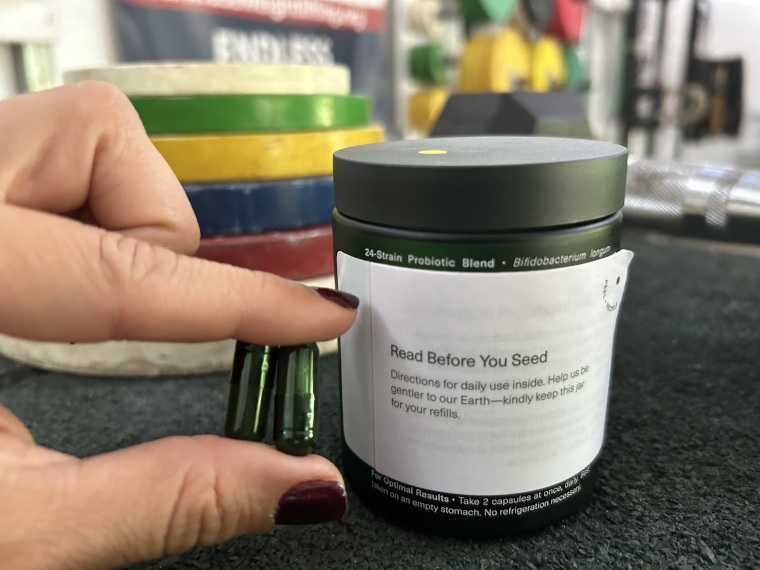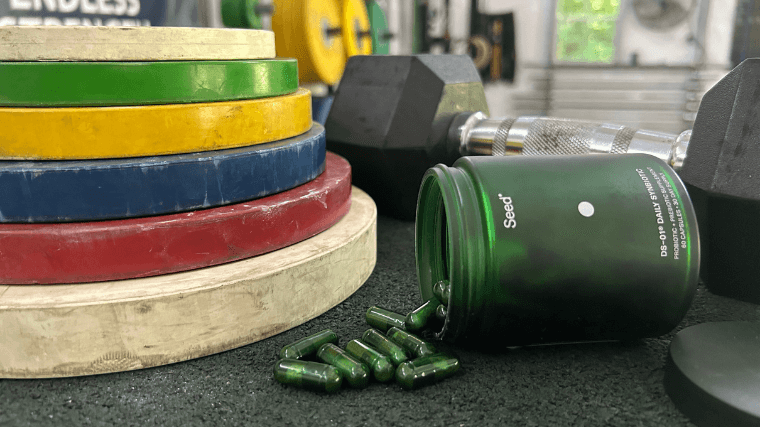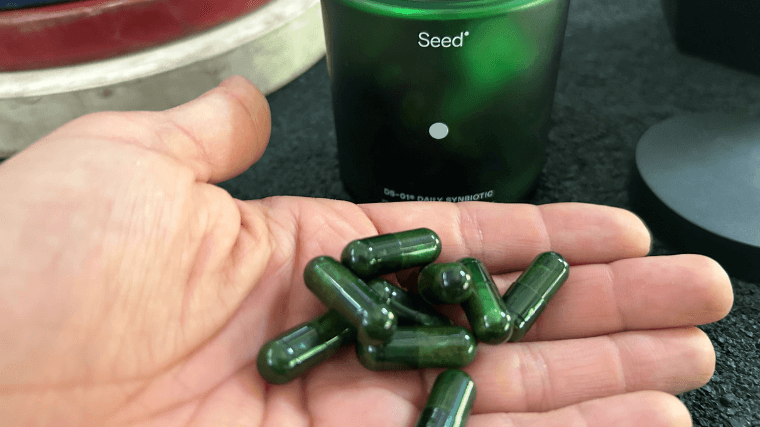Only five percent of Americans consume enough fiber — that’s a major shortfall, but we get it. (1) If you often find yourself forgetting to eat your veggies, fruits, or whole grains, or maybe you’re dealing with some pesky digestive issues like constipation, you’ll want to consider adding a fiber supplement to your regimen.
Current guidelines recommend we get 14 grams of fiber for every 1,000 calories we eat, which comes out to about 22 to 34 grams per day, depending on your caloric goals. (1) And reaching your daily fiber goals comes with a boatload of benefits aside from better digestion — we’re talking fat loss, better cholesterol levels, and heart health, among others. But before adding just any powder or pill to your cart, peruse this list for the best fiber supplements to help you reach your health goals.
The Best Fiber Supplements
- Best Fiber Supplement Overall: Transparent Labs Prebiotic Greens
- Best Fiber Supplement with Vitamins: Athletic Greens AG1
- Best Fiber Supplement for Constipation: Onnit Total Gut Health
- Best Fiber Supplement for Weight Loss: Naked Gut
- Best Fiber Supplement for Men: Transparent Labs Prebiotic Greens
- Best Fiber Supplement for Women: Seed
- Best Budget Fiber Supplement: Yerba Prima Psyllium Husk Powder
- Best Soluble Fiber Supplement: Naked Gut
- Best Organic Fiber Supplement: Garden of Life Organic Raw Fiber Powder
- Best Capsule Fiber Supplement: Yerba Prima Psyllium Husk Veg Caps
Best Fiber Supplement Overall: Transparent Labs Prebiotic Greens
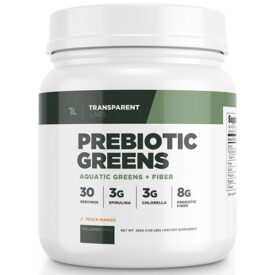
A simple but effectively-dosed supplement that emphasizes sea greens and prebiotic fiber, and contains other ingredients in full doses backed by science.
Specs
- Calories per serving: 60 calories
- Fiber per serving: 6g
- Fiber source: Acacia, Jerusalem artichoke, chicory root
- Servings per container: 30
- Price: $45.99
Pros
- Each serving contains six grams of fiber, which gets you 21 percent of your daily fiber goal.
- It contains organic spirulina and chlorella, two great sources of antioxidants and plant protein.
- The brand is transparent about the ingredients in its product and doesn’t use proprietary blends, so you know exactly what you’re getting.
Cons
- There is only one flavor available, Peach Mango, in addition to the unflavored variety.
- It doesn’t contain a high amount of any vitamins or minerals.
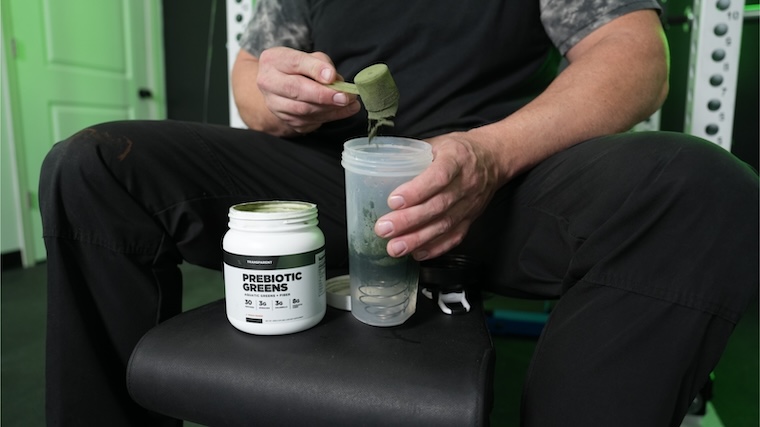
Transparent Labs Prebiotic Greens contains more fiber than your average greens powder at six grams per serving, which is about 21 percent of your daily value. We love that the fiber comes from various sources, including acacia, chicory root, and Jerusalem artichoke fiber, which all have their individual benefits to support gut health. This powder also provides three grams of plant-based protein coming from chlorella and spirulina. These algae greens are dense in micronutrients, including vitamins and minerals, and have been shown to possess antioxidant activity.
You can take this supplement up to three times a day. Simply mix a scoop with eight ounces of water — the Peach Mango flavor actually tastes pretty good, so you won’t need to mask the taste of this powder with any caloric juice or sweet beverage, and it dissolves easily. What’s more, Transparent Labs Prebiotic Greens is free of artificial colors and flavors, so you won’t get any bitter aftertaste after sipping on this drink.
Best Fiber Supplement With Vitamins: Athletic Greens AG1
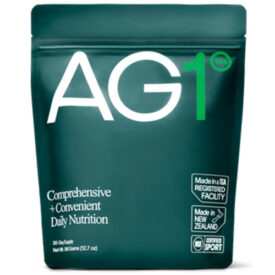
Specs
- Calories per serving: 50 calories
- Fiber per serving: 2g
- Fiber source: inulin
- Servings per container: 30
- Price: $99
Pros
- It actually tastes good, so you can enjoy it on its own mixed into water.
- AG1 is an excellent all-in-one supplement with 75 different ingredients that support gut and overall health.
- It’s NSF Certified for Sport, so it’s free from unsafe substances, guaranteed.
- The high vitamin count gives you 100 percent or more of your daily value of most B vitamins, 467 percent of your daily value for vitamin C, and more.
Cons
- The ingredient list is long, and you don’t know the exact amount of all the ingredients in each blend.
- It’s expensive, coming in at more than $3 a serving.
AG1’s long ingredient list works in its favor: With 75 different ingredients, including vitamins, minerals, digestive enzymes, antioxidants, adaptogens, and probiotics, AG1 is a great all-in-one fiber supplement that helps promote gut health and overall well-being.
You’ll get a sky-high dose of dairy-free probiotics — 7.2 billion CFUs of Lactobacillus acidophilus and Bifidobacterium bifidum — that are linked to helping with digestion. The formula also contains digestive enzymes that help your body better digest nutrients in food, which can potentially help you avoid gas and bloating.
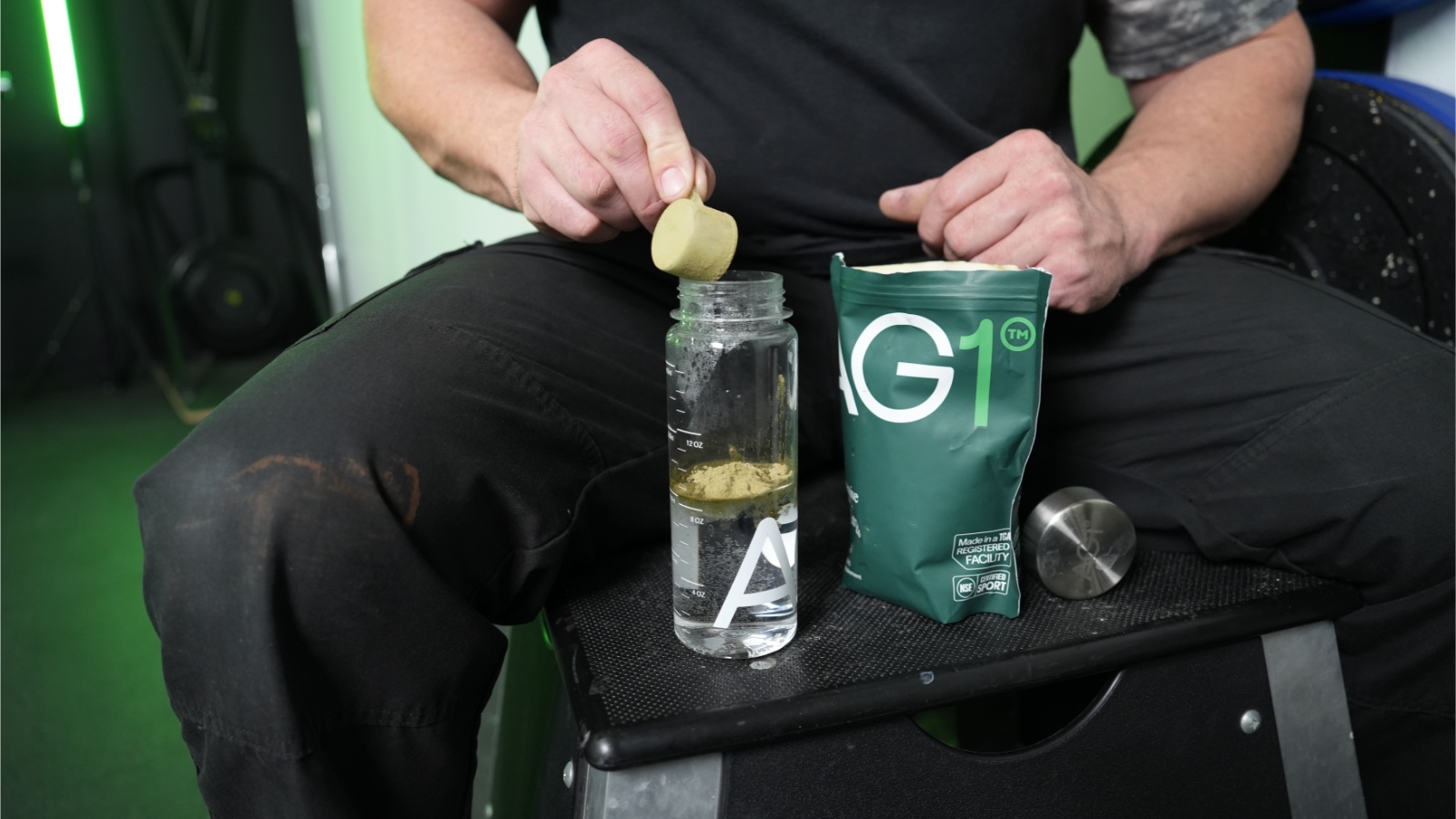
And that’s not all: You’ll also get 467 percent of your daily value for vitamin C, 100 percent or more of most B vitamins, including biotin and B12 — although it, surprisingly, doesn’t contain any vitamin D (a nutrient most of us are missing out on). And while we can’t say this for most greens powders, AG1 actually tastes good — the pineapple-vanilla flavor is subtly sweetened with stevia and works as well in protein smoothies as it does stirred into plain water.
While we appreciate that the brand lists out each and every ingredient in its blends, it’s worth noting that you won’t find exact amounts of each ingredient on the product label or the website. And given it’s jam-packed with so many beneficial nutrients, AG1 does come with a higher price point than many other fiber supplements ($99 for a 30-serving pouch). So if you’re looking for a multivitamin-like supplement that contains more than just fiber to support total health, AG1’s potential benefits might justify its price tag.
Best Fiber Supplement for Constipation: Onnit Total Gut Health
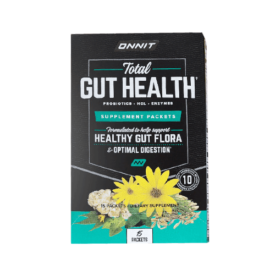
This supplement is packed with pre- and probiotics, as well as fiber from Jerusalem artichoke and dandelion root. The convenient single-serving packets make it easy to take it on the go.
Specs
- Calories per serving: N/A
- Fiber per serving: 900mg Jerusalem artichoke, 600mg dandelion root
- Fiber source: Organic Jerusalem artichoke, organic dandelion root
- Servings per container: 15
- Price: $75.90
Pros
- Comes in travel-friendly, single-serving packets filled with capsules that you can easily take on the go.
- It’s a synbiotic, containing both pre- and probiotics, to fully support gut health.
- This supp contains Jerusalem artichoke, which has been shown to help prevent constipation.
Cons
- It’s expensive, coming in at around $5 a serving.
- The seven-capsule serving may be too much for some people to swallow.
If you struggle with constipation, you’ll want a fiber supplement that contains prebiotics, probiotics, and digestive enzymes — a trifecta that helps support healthy bowel movements. Onnit Total Gut Health boasts five strains of probiotics, including L. acidophilus DDS-1, L. plantarum, L. rhamnosus, B. infantis, and B. lactis as well as organic prebiotic fibers Jerusalem artichoke and dandelion root to help feed those good gut bacteria. Its main source of fiber, Jerusalem artichoke, has been linked with constipation prevention as well as weight loss. (2)
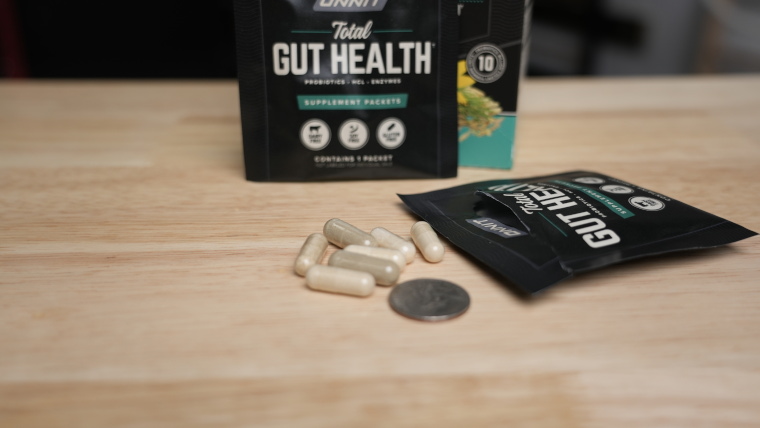
The enzyme blend helps you digest fats, lactose, carbs, protein, and fiber so that your body can better digest food and absorb its nutrients. In fact, research shows that enzyme blends can help prevent gas and bloating after eating. (3) However, all of these potential benefits come with a price: A one-month supply will run you about $75 (but you can save $10 by subscribing).
Also worth noting: This supplement comes pre-measured in a packet containing seven capsules, all offering different benefits. Onnit recommends taking all seven capsules together simultaneously with your largest meal of the day, but the capsules can be taken separately throughout the day, too. Seven capsules may be a tough pill to swallow for some (pun intended), so consider that before buying.
Best Fiber Supplement for Weight Loss: Naked Gut
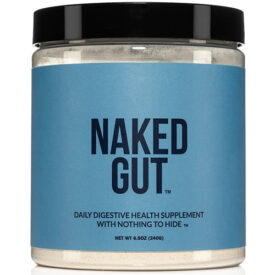
Naked Gut packs 50mg of probiotics, as well as 1,000mg of glutamine and prebiotics. The powder is unflavored, and it's fairly inexpensive considering how many helpful ingredients are in this gut health supplement.
Specs
- Calories per serving: 15 calories
- Fiber per serving: 2g
- Fiber source: Inulin (Jerusalem artichoke), citrus pectin
- Servings per container: 40
- Price: $24.99
Pros
- It’s budget-friendly compared to many other gut health supplements.
- This supp boasts added ingredients such as glutamine and probiotics to support your gut health.
- It has multiple sources of fiber that are linked to weight loss by helping to keep you fuller for longer.
Cons
- Other synbiotics contain a higher dose of probiotics.
- Naked Gut doesn’t contain added vitamins and minerals like other supplements on our list.
Naked Gut is low in calories and contains the gut-healthy amino acid glutamine as well as five billion CFU of probiotics to help bolster your microbiome. It has multiple sources of fiber, including pectin, which shows promising weight-loss benefits. In one study of 74 adults, pectin mixed in a liquid was shown to increase fullness and satiety, which is key when you’re trying to reduce your daily caloric intake. (4) Naked Gut also includes acacia, another potentially weight-loss-revving fiber. Taking acacia for six weeks was observed to help women lose over two percent body fat and lower their BMI in a study of 120 people. (5)
What’s more, this powder is easy to take — simply mix it into your favorite drink (it’s unflavored, so it won’t mess with your beverage’s taste) or blend it with a protein powder or smoothie. All in all, Naked Gut is a solid option that makes getting your fiber easy and affordable. Plus, there’s some promising evidence that links the types of fiber in Naked Gut to weight loss, so it’s definitely worth a try if your goal is to shed some fat.
Best Fiber Supplement for Men: Transparent Labs Prebiotic Greens

A simple but effectively-dosed supplement that emphasizes sea greens and prebiotic fiber, and contains other ingredients in full doses backed by science.
Specs
- Calories per serving: 60 calories
- Fiber per serving: 6g
- Fiber source: Acacia, Jerusalem artichoke, chicory root
- Servings per container: 30
- Price: $45.99
Pros
- Each serving provides 21 percent of your daily fiber goal.
- It contains organic spirulina and chlorella, which are two great sources of antioxidants and plant protein.
- Prebiotic Greens contains more fiber than many other greens powders, which is important since fiber is especially linked to good immune health in men.
Cons
- There are only two flavor options, Peach Mango and Unflavored.
- It has fairly low amounts of vitamins or minerals.
Research has found a significant association between daily dietary fiber intake and good general health status and immune health, especially in men. (6) And Transparent Labs Prebiotic Greens contains more fiber than your regular greens powder, with about 21 percent of your daily value per serving coming from acacia, chicory root, and Jerusalem artichoke. Thanks to all the plant-based foods in this greens powder, you’ll also get three grams of vegan protein, mainly from chlorella and spirulina.
Enriched with a variety of superfoods, Prebiotic Greens offers a broad spectrum of nutrients, including antioxidants from ingredients like spirulina and chlorella, which support your body’s defense against oxidative stress and promote cellular health. Plus, you’ll get vitamins and minerals as well as zero artificial flavors, colors, and additives. Whether you’re aiming to support digestion, boost immunity, or simply increase your daily nutrient intake, Transparent Labs Prebiotic Greens offers a convenient way to support your whole health.
Best Fiber Supplement for Women: Seed
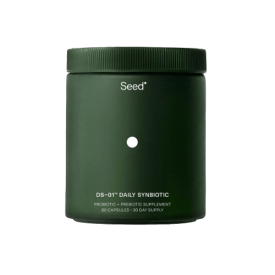
Seed Daily Synbiotic's probiotic and prebiotic formula can help provide benefits for gut immune function and whole-body health. This research-backed daily supplement can also support digestive health and ease bloating. Use code BARBEND20 for 20% off your first purchase.
Specs
- Calories per serving: N/A
- Fiber per serving: 400 mg or 4 g
- Fiber source: pomegranate
- Servings per container: 30
- Price: $50
Pros
- It’s a comprehensive synbiotic with prebiotics and probiotics to support immune health and digestion.
- It contains specific probiotic strains that are linked with eczema prevention in babies when pregnant and breastfeeding women take it.
- The Seed website lists the benefits of each probiotic strain in their formula along with clinical studies, offering more transparency than most brands.
Cons
- It’s more expensive than other options on this list.
- It only comes in capsule form, so this pick may not be for you if you have trouble swallowing pills.
Seed is a robust synbiotic with a blend of prebiotics and probiotics for total-body health. You’ll get 400 mg of prebiotics from Indian pomegranate as well as 53.6 Billion AFU (or active fluorescent units, a purportedly more accurate measure than CFU). Each probiotic blend has specific strains aimed at supporting the health of your heart, skin, digestion and more. The lactobacilli included in this blend may be particularly helpful for women, as studies have suggested that it may help prevent cervical cancer. (7)
And the dermatological health blend contains the L rhamnosus strain, which has been linked with eczema prevention in growing babies when pregnant and breastfeeding mothers take it. (8) That said, we appreciate that Seed provides a comprehensive Reference Library detailing strain-specific studies associated with each benefit, so you can easily do a deep dive into the brand’s research.
A 30-day supply will run you $50, so this product isn’t the most affordable one around, but you do get what you pay for. It all comes in a refillable glass jar that you keep to store your Seed pills every month. And here’s a big bonus: This probiotic/prebiotic supplement doesn’t require refrigeration, so you won’t have to worry about it losing its potency on the shelf or when you travel. Additionally, it comes with a vial that holds a one-week supply so that you can take Seed with you on the go.
Best Budget Fiber Supplement: Yerba Prima Psyllium Husk Powder
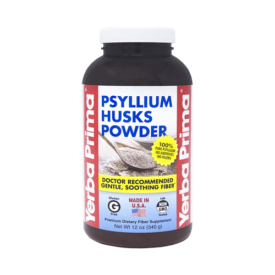
At under $20 for a two-month supply, this blend of soluble and insoluble fibers is a solid bargain.
Specs
- Calories per serving: 15 calories
- Fiber per serving: 4.5 g
- Fiber source: Psyllium
- Servings per container: 68
- Price: $18.47
Pros
- It comes in at about 27 cents per serving, making this an economical option in the long run.
- This supplement contains almost an equal amount of soluble and insoluble fibers, which can aid in digestion.
- You can buy it on Amazon (aka fast, two-day shipping).
Cons
- The texture might be off-putting to some people, as the powder can sometimes form into globs as it dissolves in water.
- Some complain that the flavor is a bit oat-like and prefer to mix it with juice or a smoothie instead of just water.
Yerba Prima Psyllium Husk Powder is a natural fiber supplement that helps you stay regular and supports your heart health. If you’re looking to add a fiber supplement to your routine and want something affordable enough to use daily and long-term, add this pick to your cart. It contains 68 servings (about a two-month supply) and comes in at about 30 cents per serving, which is a good amount cheaper than many options on this list. And you can take up to three servings a day with or between meals — but you should start with just one serving a day and work your way up as your body adjusts to the extra fiber in your diet. FYI, it works best when used every day and can be used for as long as you want.
With just one ingredient — psyllium husk powder — this pick ensures you get high-quality fiber without any extra stuff. It’s free from GMOs, artificial flavors, colors, added sugar, binders, and fillers. Psyllium husk powder has been shown to help manage IBS and relieve both constipation and diarrhea as well as offer cholesterol-lowering benefits. (4) Stir this unflavored powder into a full glass of water or another beverage of choice.
Best Soluble Fiber Supplement: Naked Gut

Naked Gut packs 50mg of probiotics, as well as 1,000mg of glutamine and prebiotics. The powder is unflavored, and it's fairly inexpensive considering how many helpful ingredients are in this gut health supplement.
Specs
- Calories per serving: 15 calories
- Fiber per serving: 2g
- Fiber source: Inulin (Jerusalem artichoke), citrus pectin
- Servings per container: 40
- Price: $24.99
Pros
- It’s on the cheaper side of fiber supplements.
- Naked Gut had added ingredients like glutamine and probiotics.
- The soluble fiber in this supplement can help you feel fuller, longer.
Cons
- Other synbiotics contain more probiotics.
- It doesn’t contain the added vitamins and minerals that you’ll find in other supplements on our list.
Naked Gut is made with three sources of soluble fiber: pectin, inulin, and acacia. Unlike insoluble fiber, soluble fiber mixes with water — and that’s what helps it slow down your digestion, keeping you fuller for longer and helping control your blood sugar levels. (9) Soluble fiber is also linked to lower cholesterol levels and a reduced risk of heart disease. Plus, getting more soluble fiber in your diet might even help diversify your gut microbiome. The inulin in this supplement is associated with increased Bifidobacterium, a beneficial gut bacterium. (10)
Naked Gut also features soluble fiber from acacia, which is shown to aid in weight loss and help improve satiety without triggering any stomach discomfort that may come with other types of fiber supplements. (11) We also love that Naked Gut contains prebiotics — five billion CFUs to be exact — which thrive off all that fiber and help boost your microbiome. So if you find yourself skimping out on soluble fiber sources like whole grains, seeds, and legumes, you might consider trying this supplement.
Best Organic Fiber Supplement: Garden of Life Organic Raw Fiber Powder
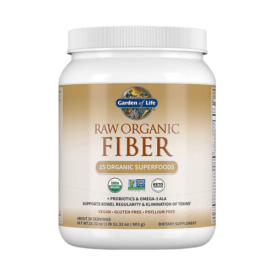
This potent supplement contains both soluble and insoluble fiber, a gram of omega-3 fatty acids, and eight grams of protein. Plus, the psyllium-free formula is easier to digest, making ideal for sensitive stomachs.
Specs
- Calories per serving: 120 calories
- Fiber per serving: 9g
- Fiber source: sprouted seeds, grains, and legumes
- Servings per container: 10
- Price: $21.99
Pros
- It boasts the highest fiber content out of all the options on our list, clocking in at nine grams of fiber per serving (or 32 percent of your daily value).
- This supplement is easy to digest and suitable for sensitive stomachs thanks to its psyllium-free formula.
- It’s USDA-certified organic and NSF Certified for Sport.
Cons
- This has a similar number of calories as a protein powder (at 120 calories a serving) because of added fats, carbs, and protein — but this may not be a disadvantage if you’re more concerned about whole-health nutrition than calories.
- It’s on the expensive side, coming in at a little over $2 a serving.
Garden of Life’s Organic Raw Fiber Powder is USDA-certified organic and offers a robust source of fiber at nine grams per serving — that’s an impressive 32 percent of your daily value, making this the highest-fiber product on our list. The fiber blend almost equally combines soluble and insoluble fiber from sprouted seeds, grains, and legumes. Also worth noting: This pick is psyllium-free. But that doesn’t imply psyllium is bad for you — it’s actually an excellent source of fiber and the key ingredient in many fiber supplements — it just might be too harsh on some digestive systems as it can have a laxative effect.
But fiber isn’t the only nutrient this supp contains: Comprising a blend of 15 raw organic superfoods, it’s a nutrient-packed option enriched with one gram of anti-inflammatory omega-3 fatty acids derived from flax and chia seeds. It also packs eight grams of muscle-building protein, three grams of fats, and 120 calories, making this product a well-rounded supplement that can give your daily diet a little nutritional help. This neutral-tasting fiber supplement is versatile, too — you can blend it with water or your preferred liquid, or stir it into foods like oatmeal and soups for a seamless fiber boost.
Best Capsule Fiber Supplement: Yerba Prima Psyllium Husk Veg Caps
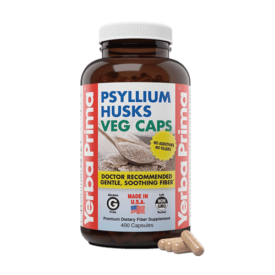
These capsules make it easy to get your fiber on the go. Plus, the vegetarian capsules make them ideal for people avoiding animal products.
Specs
- Calories per serving: 8 calories
- Fiber per serving: 2.2g
- Fiber source: psyllium
- Servings per container: 100
- Price: $26.57
Pros
- Fiber capsules offer convenient, pre-measured doses of fiber without the need for mixing or measuring, making them ideal for those on the go.
- These contain just a single ingredient: Psyllium, which is perfect for people who only want fiber.
- Psyllium is an excellent source of soluble fiber, which may help minimize the risk of heart disease, as well as aid digestion.
Cons
- The serving size, four capsules, is quite large; however, the pills are easy to swallow.
- Since this is in capsule form, it’s a little less versatile as you won’t be able to mix it into water or your morning smoothie.
If mixing fiber powders into water seems like a hassle and you’d rather just pop a pill, the Yerba Prima Psyllium Husk Veg Caps are a solid option to take daily. They contain 100 percent whole psyllium husks, a type of fiber that’s linked to helping with IBS as well as both constipation and diarrhea. (4)
Unlike other brands that pack extra ingredients into their formulas, these capsules are free from artificial flavors and colors, added sugar, binders and fillers, and preservatives. You’ll get a little over two grams of fiber per four-capsule serving to support digestion. While some may find that the serving is quite large (after all, four pills are a lot to swallow), the capsules are actually not too large and go down easily.
We love that these are portable and travel-friendly, so you can keep up with your fiber regimen even when you’re on the go. And the capsule form provides a tasteless and mess-free alternative to fiber powders. If you want to support colon health, promote regularity, or add a feeling of fullness before meals, these capsules might be your new go-to.
How We Chose the Best Fiber Supplements
With so many fiber products on the market, it can be hard to decipher which ones deliver on their promises. We did the legwork for you and researched countless products, and ultimately chose the best fiber supplements that include high quality ingredients, offer a substantial source of fiber, and fit a wide range of budgets. Check out our supplement testing methodology for more information.
Cost
Our list includes options ranging from as low as $18 all the way to $99. The more expensive fiber supplements contain added benefits in the form of functional ingredients (think: vitamins, minerals, probiotics, or adaptogens), justifying their higher price tag. So if you’re looking for a well-rounded supplement that’ll give you a lot more than just fiber, you might consider shelling out the extra bucks for a pricier powder or pill.
When shopping for a fiber supplement, people tend to purchase an option that will become part of their daily routine. And because taking a supplement daily can become expensive, we included products that fit a wide range of budgets.
Added Ingredients for Gut Health
Probiotics are fiber’s best friend — these beneficial gut bugs feed on fiber in a symbiotic relationship that helps build a more robust microbiome. Probiotics are also linked to various benefits, including regular bowel movements, lower inflammation, less bloating and gas, better immunity, and mood support. That’s why we favored products that include both probiotics and prebiotics, which collectively are known as a synbiotic.
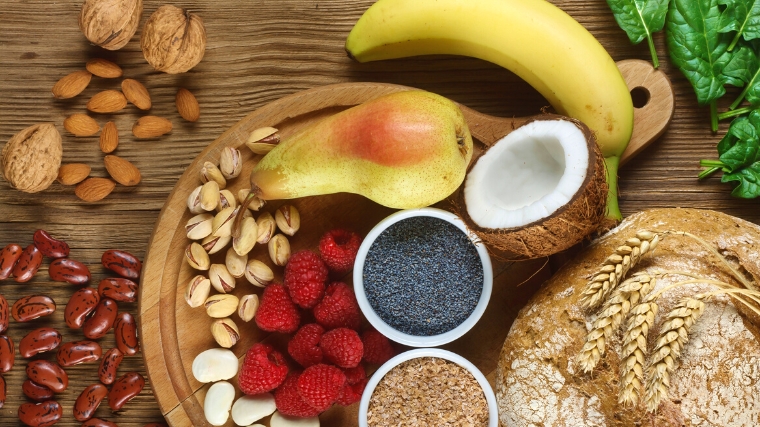
Other ingredients you might find in all-in-one fiber supplements are micronutrients, aka vitamins and minerals. Some products contain these added micronutrients to help you reach your nutrient daily value goal, which is important for avoiding deficiencies — especially if your diet lacks fruits and vegetables.
We also favored products that include digestive enzymes, which help you digest food and effectively absorb the nutrients from food. Some people naturally lack digestive enzymes, which is why they may experience discomfort and symptoms like bloating and gas — so if that sounds like you, experimenting with a fiber supp that includes these enzymes might be a smart move.
Dosage
The fiber supplements on our list have varying dosages ranging from two grams of fiber per serving up to nine grams. If you’ve never used a fiber supplement before, you’ll want to start off with a minimal dosage since introducing too much fiber into your diet too quickly can contribute to constipation. But that doesn’t mean you’re limited to shopping products that only have two to three grams of fiber — you can easily buy a higher-dosage product and start with half the serving size, working your way up to a full serving as your body adjusts to the extra fiber. And remember, always drink plenty of water when adding more fiber to your diet to help avoid constipation.
Different Types of Fiber Supplements
Fiber supplements come in two main forms: powders that you stir into liquid or pills that you swallow whole. Depending on your preferences, you can choose either or — they’re both equally effective. They are also split into soluble and insoluble fiber; more on that below.
Soluble vs. Insoluble Fiber
Soluble and insoluble fiber are two main types of dietary fiber found in plant foods, and they each come with distinct properties and health benefits. Soluble fiber dissolves in water to form a gel-like substance, which helps slow down digestion, keeping you fuller for longer and supporting weight-loss efforts, as well as regulating blood sugar and lowering cholesterol levels. (5)
Insoluble fiber doesn’t dissolve in water and remains largely intact as it moves through the digestive system. That’s why this type of fiber promotes regular bowel movements by adding bulk to stools and preventing constipation. (12)
Powders
If you find it hard to swallow pills, or just don’t like to, a powdered fiber supplement is your best bet. Powders can be easily mixed into water, but you can also add them to your go-to smoothie recipe and make them into a balanced snack or meal. Some powders come in flavor varieties, which can make getting your fiber a bit more fun.
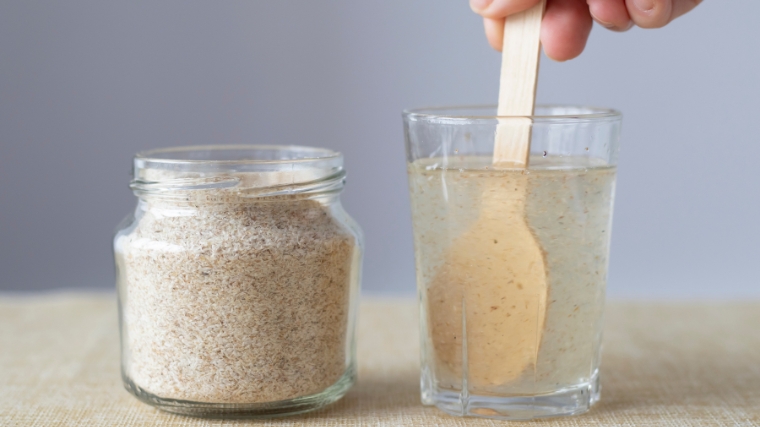
One small downside: Powders may not be as portable as capsules if they come in a plastic container; however, many brands offer single-serve packages that are travel-friendly and make taking your supp with you easy.
Capsules or Pills
Capsules are super easy to take — you just pop them into your mouth and down a glass of water. You don’t have to mix your supplement with a liquid, which can be messy and sometimes lead to clumping. And that means you can easily take fiber capsules with you on the go for fuss-free supplementation. Translation: You’ll be able to maintain your fiber intake even when you’re away from home.
What’s more, capsules eliminate any taste or texture concerns you might get from powdered supplements. While we find that some greens powders that contain fiber taste earthy, most of the picks on our list got solid scores for taste.
Benefits of Fiber Supplements
Simply put, fiber supplements come with all the benefits of adding more fiber to your diet. While fiber is often associated with helping keep you regular, it actually boasts a slew of other health perks that might convince you to up your fiber game.
Digestion Support
Adding a fiber supp to your routine can help promote regular bowel movements and alleviate constipation by adding bulk to your stool and promoting healthy bowel function.
Soluble fiber forms into a gel as it makes its way through your intestines, helping manage both diarrhea and constipation. And think of insoluble fiber as a natural scrub brush for your intestines — it helps waste move through the digestive tract more easily and prevents stool from becoming hard and difficult to pass.
What’s more, eating a fiber-rich diet is actually linked with a lower risk of developing colorectal cancer, keeping your digestion humming for the long run. (13)
Potential Whole-Body Benefits
Fiber offers many benefits beyond just making it easier to go number two. A high-fiber diet keeps your heart healthy by lowering harmful cholesterol levels as well as helps with blood sugar control, therefore reducing your risk of developing type 2 diabetes. (12) Getting enough fiber in your diet can also help you lose weight or maintain a healthy weight by helping you feel full for longer and curbing your appetite.
Convenience
Using fiber supplements is a convenient way to up your fiber intake, especially if you’re finding it hard to eat enough high-fiber foods. They offer a reliable and controlled dose of fiber and you can even choose the type of fiber in a supplement you want.
Just remember, while supplements are handy, they can’t replace all the good stuff that comes from a balanced diet with whole, fiber-rich foods such as fruits, veggies, legumes, and whole grains. And it’s always a good idea to chat with your dietitian or doctor before starting any new supplement routine, especially if you’re on prescribed medications.
Final Word
All in all, fiber supplements are a great way to bridge nutritional gaps if you find that your diet is lacking fruits, vegetables, legumes, and whole grains. But there are many different types of fiber supplements: Some come in capsule form, while others come as a powder that you mix into liquid. More budget-friendly supps are comprised of just one source of fiber, either soluble or insoluble. Meanwhile, other supps may come with added functional ingredients, such as probiotics, adaptogens, digestive enzymes, and micronutrients, giving you a more holistic, well-rounded supplement that might be able to replace other supplements in your routine (and therefore justify the higher price tag).
Ultimately, choose a fiber supplement that you know you’ll take daily. If you’re always on the go and need something portable, go with a capsule. But if you don’t like swallowing pills and prefer to mix something into water or your morning smoothies or post-gym shakes, consider opting for a powder. Once you dial in your budget, the kind of fiber you need, and how you prefer to take it, you can use this list to help you zero in on the best one.
FAQs
What is the best fiber supplement to take?
The best form of fiber to take depends on your health goals. If you’re looking for a fiber supplement to help with constipation, choose one that favors insoluble fiber, which helps add bulk to your stool to move it along more easily.
Meanwhile, one of the main benefits of soluble fiber is that it absorbs water and expands in your stomach, helping you feel fuller and less likely to overeat. Our favorite fiber supplement right now is Transparent Labs Prebiotic Greens because it contains an impressive six grams of both soluble and insoluble fiber (that’s 21 percent of your daily value) as well as antioxidants from spirulina and chlorella.
Are fiber supplements actually good for you?
Fiber supplements can be a smart addition to your diet, especially if you struggle to eat enough plant-based foods (as fiber is only found in plant sources). Adding a fiber supp to your routine can help bridge nutritional gaps in your diet while offering digestive support, like relief from constipation.
Is it OK to take fiber supplements daily?
Yes, fiber supplement brands recommend taking them daily to reap their potential benefits. As with most supplements, their effectiveness really shines when incorporated into a daily routine because that’s when you get those sustained benefits. Always check the serving suggestions and instructions on your supplement’s label before taking it.
References
- How Do You Choose the Best Fiber Supplement? (2023, June 29). Cleveland Clinic. https://health.clevelandclinic.org/best-fiber-supplements/
- Sawicka, B., Skiba, D., Pszczółkowski, P., Aslan, I., Sharifi-Rad, J., & Krochmal-Marczak, B. (2020). Jerusalem artichoke (Helianthus tuberosus L.) as a medicinal plant and its natural products. Cellular and molecular biology (Noisy-le-Grand, France), 66(4), 160–177.
- Graham, D. Y., Ketwaroo, G. A., Money, M. E., & Opekun, A. R. (2018). Enzyme therapy for functional bowel disease-like post-prandial distress. Journal of digestive diseases, 19(11), 650–656.
- Tiwary, C. M., Ward, J. A., & Jackson, B. A. (1997). Effect of pectin on satiety in healthy US Army adults. Journal of the American College of Nutrition, 16(5), 423–428.
- Babiker, R., Merghani, T. H., Elmusharaf, K., Badi, R. M., Lang, F., & Saeed, A. M. (2012). Effects of Gum Arabic ingestion on body mass index and body fat percentage in healthy adult females: two-arm randomized, placebo controlled, double-blind trial. Nutrition journal, 11, 111.
- Fernstrand, A. M., Bury, D., Garssen, J., & Verster, J. C. (2017). Dietary intake of fibers: differential effects in men and women on perceived general health and immune functioning. Food & nutrition research, 61(1), 1297053.
- Muhammad Shahid Riaz Rajoka, Haobin Zhao, Yao Lu, Ziyang Lian, Na Li, Nazim Hussain, Dongyan Shao, Mingliang Jin, Qi Li, Junling Shi. (2018). Anticancer potential against cervix cancer (HeLa) cell line of probiotic Lactobacillus casei and Lactobacillus paracasei strains isolated from human breast milk. Food Funct. 2018 May 23;9(5):2705-2715. doi: 10.1039/c8fo00547h.
- Keren E. Dolan, MS, CNS, Jessica M. Pizano, MS, CNS, et al. Probiotics and Disease: A Comprehensive Summary—Part 6, Skin Health (Aug 2017). Integr Med (Encinitas). 2017 Aug; 16(4): 32–41.
- Health benefits of dietary fibers vary. (2022, May 23). National Institutes of Health (NIH). https://www.nih.gov/news-events/nih-research-matters/health-benefits-dietary-fibers-vary#:~:text=Soluble%20fibers%20mix%20with%20water
- Del Piano, M., Carmagnola, S., Anderloni, A., Andorno, S., Ballarè, M., Balzarini, M., Montino, F., Orsello, M., Pagliarulo, M., Sartori, M., Tari, R., Sforza, F., & Capurso, L. (2010). The use of probiotics in healthy volunteers with evacuation disorders and hard stools: a double-blind, randomized, placebo-controlled study. Journal of clinical gastroenterology, 44 Suppl 1, S30–S34.
- Larson, R., Nelson, C., Korczak, R., Willis, H., Erickson, J., Wang, Q., & Slavin, J. (2021). Acacia Gum Is Well Tolerated While Increasing Satiety and Lowering Peak Blood Glucose Response in Healthy Human Subjects. Nutrients, 13(2), 618.
- Masrul, M., & Nindrea, R. D. (2019). Dietary Fibre Protective against Colorectal Cancer Patients in Asia: A Meta-Analysis. Open access Macedonian journal of medical sciences, 7(10), 1723–1727.
- Mayo Clinic . (2021). Dietary fiber: Essential for a healthy diet. Mayo Clinic. https://www.mayoclinic.org/healthy-lifestyle/nutrition-and-healthy-eating/in-depth/fiber/art-20043983
